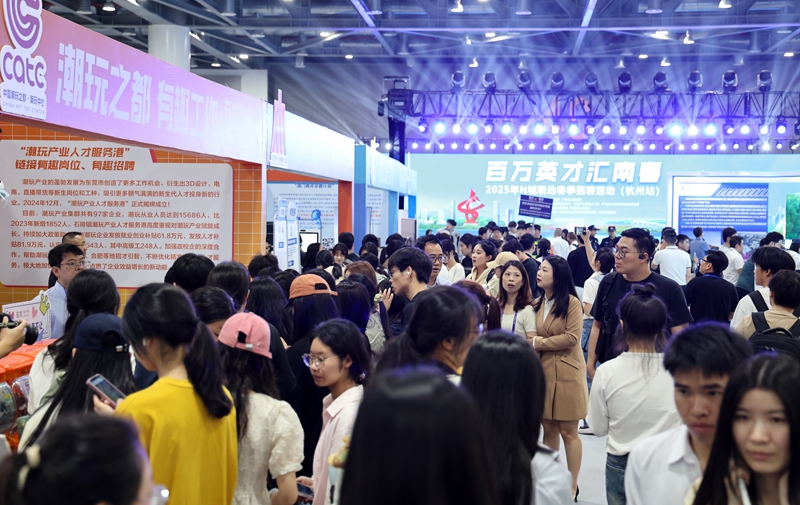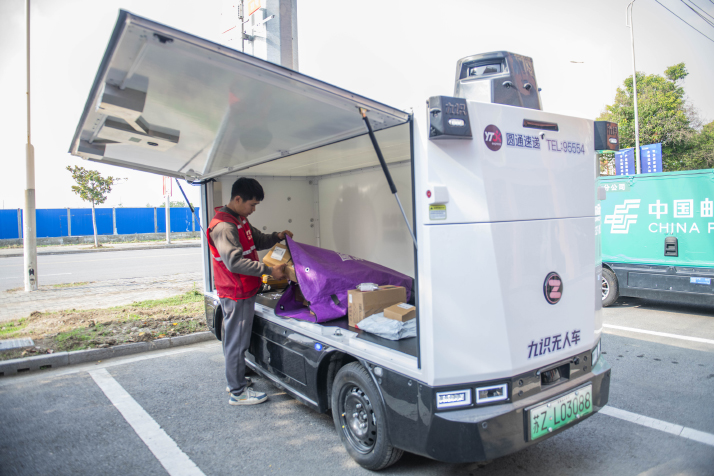| China |
| The improvement of labor protections for new occupations | |
|
|
 A job fair in Hangzhou, Zhejiang Province, on April 19 (XINHUA)
'Finally, the company will provide us delivery riders with social insurance. It feels like a dream come true." This sentiment, expressed by 36-year-old delivery rider Li Wenmin of Chinese online services platform Meituan, captures the growing optimism among a workforce that has long faced precarious employment conditions. After seven years of navigating the bustling streets and alleys as a delivery rider, Li shared his relief and excitement with his family. For Li, flexible working hours and the potential for a decent income have always been appealing, but the lack of social security has been a constant concern—both for him and his loved ones. With the announcement made earlier this year that online platforms, including industry leaders Meituan and JD.com, will start buying social insurance for full-time and stable part-time delivery riders, Li feels a newfound sense of security and stability for the future. Many delivery riders previously operated without social insurance as they are usually classified as independent contractors rather than employees. While this classification allowed for flexibility in work schedules, it also meant that traditional employee benefits were not provided. However, recent developments signal a transformative shift in how the gig economy recognizes and supports its workers. Companies are now taking steps to ensure their delivery riders receive the necessary protections—an evolution in the labor landscape. As these protections become more widespread, riders are beginning to view their roles as stable career options, fostering a sense of belonging and professional identity within the workforce. This trend extends beyond the gig economy to encompass all new occupations that have emerged in recent years as the country's workforce diversifies and evolves.  A livestream host, dressed in the traditional Han Chinese attire, sells flowers online in Shanghai on April 10 (XINHUA)
Expanding insurance network In China, employers are mandated to share the social security premium costs of their full-time employees, while contractors and self-employed individuals can contribute to the social welfare fund voluntarily. Employers are required to contribute to five major insurance schemes, namely, pension insurance, medical insurance, unemployment insurance, work injury insurance and maternity insurance, as well as a housing fund. Contribution rates and benefits differ by city due to localized management. In the past, flexible workers, such as food delivery riders, were excluded as they lacked formal labor contracts. The recent introduction of social insurance in the sector has also led delivery riders to reevaluate their careers. Gu Enrui, a Meituan delivery rider who has been with the company for five years, shared her perspective with newspaper Lanzhou Daily. "I started making deliveries after having my second child, initially thinking it would just be a temporary job that allowed me to take care of my kids. Over time, I found the income to be quite good, so I decided to keep doing it," she said. "I used to feel like a temporary worker without any security, but now that we have social insurance, I feel I can settle down and further develop my career in this industry." In early April, Meituan announced plans to expand social insurance coverage for its food delivery riders, launching pilot programs for pension insurance in Quanzhou, Fujian Province, and Nantong, Jiangsu Province. The program is open to all riders in these areas, covering some 22,000 individuals, with plans to gradually expand nationwide. Riders can enroll in employee social insurance as flexible workers. Under the pilot scheme, the company will subsidize 50 percent of the costs for those who participate on a voluntary basis and meet the company's eligibility threshold. E-commerce giant JD.com has established formal labor relationships with its delivery riders by hiring them as full-time staff. Under this arrangement, the company fully covers all social insurance costs for its riders. The news of social insurance for riders has also attracted fresh talent to the delivery sector. "This morning alone, I interviewed four new candidates. In previous years, we might only have one or two applicants at this time," Liang Shiwei, manager of the Meituan delivery station at Lanzhou Jiaotong University, told Lanzhou Daily. Currently, the delivery station has 45 riders, with an average tenure of one to three years. Liang notes that delivery riders have historically experienced high turnover, often viewing their roles as temporary. However, with the implementation of social insurance, riders will no longer be "running bare without protection." This shift not only enhances their sense of professional identity and security but also helps reduce turnover and improve service quality. "With social insurance, experienced riders can work with peace of mind and stay in the industry longer, while also more newcomers will be attracted. This benefits the sector's long-term growth and sustainability," Liang added. In recent years, the delivery industry has seen a surge in protective policies for riders. Since July 2022, under the guidance of the Ministry of Human Resources and Social Security (MHRSS), Meituan has launched a pilot program for occupational injury insurance for people working for the platform, investing 1.4 billion yuan ($191 million) to cover riders across seven pilot provinces and cities. This initiative will eventually cover all riders nationwide.  A delivery worker loads packages into an autonomous vehicle for delivery in Suzhou, Anhui Province, in November 2024 (XINHUA)
Flexibility and security Zhang Chenggang, an associate professor at the School of Labor Economics at Capital University of Economics and Business in Beijing and director of the school's China New Employment Form Research Center, believes that the move by JD.com and Meituan to offer social insurance to delivery riders has drawn public attention to the rights of workers in new forms of employment. "This initiative is expected to set a precedent for the entire gig economy and flexible workforce," he told Beijing Review. China currently has one of the world's largest social security systems. As of last September, MHRSS data showed that the number of people covered by basic old-age insurance, unemployment insurance and work-related injury insurance had reached 1.07 billion, 245 million, and 301 million, respectively. Yet gaps remain, especially for the large flexible workforce. The All-China Federation of Trade Unions estimates 84 million workers are now in new employment forms. However, their rights are not as well defined as those of workers in traditional industries, leading to disputes. From 2020 to 2024, Chinese courts handled approximately 420,000 civil dispute cases tied to such jobs, official statistics showed. In December 2024, the Supreme People's Court addressed these challenges by issuing judicial guidelines to protect workers in gig roles—including delivery riders, livestreamers and ride-hailing drivers—while balancing platform economy growth. At a press conference, it released a list of typical cases on wage disputes and labor conflict resolution in emerging industries. "The Labor Contract Law of China mainly addresses traditional employment types, making it difficult to apply to the characteristics and needs of flexible employment. This results in the inadequate protection of the legal rights of flexible workers in terms of wages, working hours and social security," Jia Yu, President of the Shanghai High People's Court, told Legal Daily newspaper. Jia suggested revising the law to further protect flexible workers' wages, standardize working hours and clarify the obligations and coverage related to social insurance contributions. Jia added that to address the issue of rights protection for new employment groups, all parties must work together to form a consensus. Local authorities have also stepped up conflict resolution by implementing clearer guidelines for labor rights and facilitating communication between workers and employers. In doing so, they foster a more supportive environment for flexible workers. For example, on April 3, Fengtai District in Beijing officially launched a one-stop mediation center for labor disputes related to new forms of employment at its public employment demonstration service base. This center will provide a comprehensive range of services, including dispute mediation, legal consultation, legal aid, assessments for work-related injuries, mobile hearings, judicial confirmations, prosecutorial duties, career guidance and skill enhancement. It intends to create a sustainable and precise framework for protecting the rights of workers in emerging industries, ensuring that their rights are fully safeguarded throughout the entire process. "In a large and unevenly developed country like China, the widespread implementation of social security cannot be achieved overnight," Zhang said. He believes that the key lies in designing a social security system that, based on China's specific conditions, protects rights, does not hinder employment and operates sustainably, while also promoting a more equitable and reasonable income distribution. "The ultimate goal is to ensure that everyone participating in economic activities can receive returns that match their contributions, enjoy decent work conditions and have the opportunity for a dignified retirement, truly realizing the development philosophy of sharing the benefits of growth with the people," he concluded. Copyedited by Elsbeth van Paridon Comments to luyan@cicgamericas.com |
|
||||||||||||||||||||||||||||
|